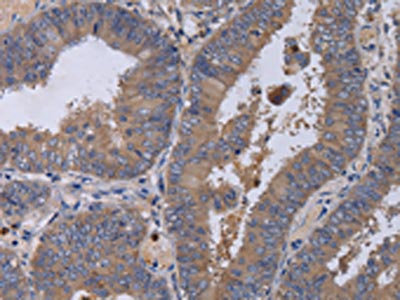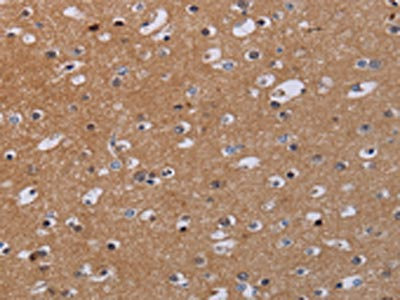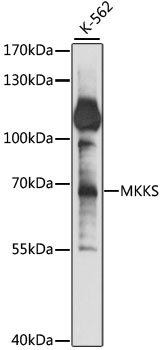
The image on the left is immunohistochemistry of paraffin-embedded Human colon cancer tissue using CSB-PA569334(MKKS Antibody) at dilution 1/50, on the right is treated with fusion protein. (Original magnification: x200)
MKKS Antibody
CSB-PA569334
ApplicationsELISA, ImmunoHistoChemistry
Product group Antibodies
ReactivityHuman
TargetMKKS
Overview
- SupplierCusabio
- Product NameMKKS Antibody
- Delivery Days Customer20
- ApplicationsELISA, ImmunoHistoChemistry
- CertificationResearch Use Only
- ClonalityPolyclonal
- ConjugateUnconjugated
- Gene ID8195
- Target nameMKKS
- Target descriptionMKKS centrosomal shuttling protein
- Target synonymsBBS6, HMCS, KMS, MKS, molecular chaperone MKKS, Bardet-Biedl syndrome 6 protein, McKusick-Kaufman/Bardet-Biedl syndromes putative chaperonin, alternative protein MKKS
- HostRabbit
- IsotypeIgG
- Protein IDQ9NPJ1
- Protein NameMolecular chaperone MKKS
- Scientific DescriptionThis gene encodes a protein which shares sequence similarity with other members of the type II chaperonin family. The encoded protein is a centrosome-shuttling protein and plays an important role in cytokinesis. This protein also interacts with other type II chaperonin members to form a complex known as the BBSome, which involves ciliary membrane biogenesis. This protein is encoded by a downstream open reading frame (dORF). Several upstream open reading frames (uORFs) have been identified, which repress the translation of the dORF, and two of which can encode small mitochondrial membrane proteins.
- ReactivityHuman
- Storage Instruction-20°C or -80°C
- UNSPSC41116161





